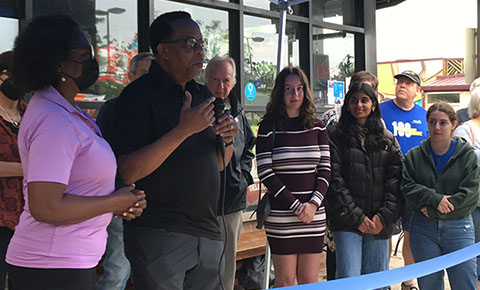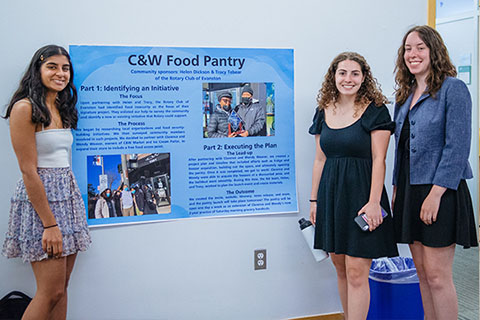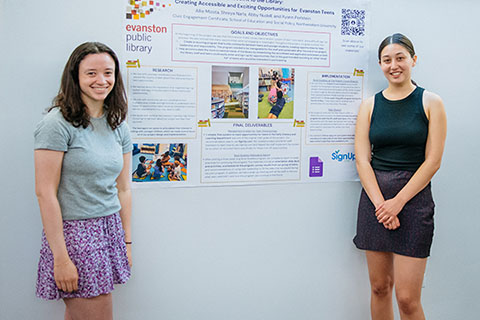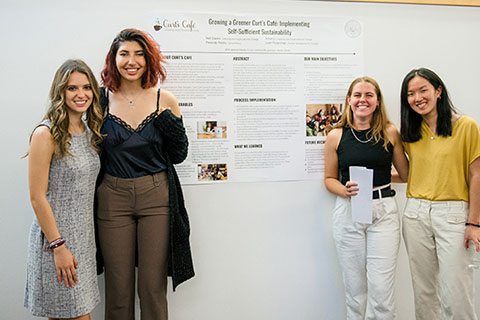Civic Engagement: Learning to Make a Difference

Students in Northwestern University’s Civic Engagement Certificate Program partnered with the Rotary Club of Evanston and C & W Market to help fight local food insecurity.
The project, funded by a $10,000 grant to the CW Foundation from the Rotary Club of Evanston through its Centennial Focus Project, builds on a grass roots initiative that started at the beginning of the COVID-19 pandemic.
Every Saturday for the last two years, storeowners Clarence and Wendy Weaver have been offering groceries to families in need, an operation they set up on the sidewalk outside their business. The support from Rotary and the Northwestern students will help the Weavers acquire refrigerators and freezers, build out the pantry space, secure food supplies, and move the operation into a more private area.
Ideally, the food pantry will provide Evanston residents with access to fresh produce, fresh meats, and more non-perishable items at a safe and trusted location. Early on, the Weavers handed out food to about 25 families. They now serve more than 250.
Over the past year, the undergraduates–Sydney Goldstein, Tanya Bhargava, Haley Wanner, and Anna Witcoff–met regularly with the Weavers and Rotary sponsors, including Helen Dickson and Tracy Tebear. They researched ways to sustain the pantry, and planned an opening ceremony, that included Clarence and Wendy Weaver, Evanston Mayor Daniel Biss, Ald. Bobby Burns (5th), and other volunteers.
“The Civic Engagement Certificate creates the educational context for learning about and improving the community outside the University,” said Dan Lewis, professor of human development and social policy.
“As Mayor Biss said, the ribbon cutting ceremony, which took place at the store and near Evanston Township High School, showed off the best of the town gown relationship. Our students learned and put that knowledge to work helping to feed the hungry. This is our University at its best.”
 Bhargva, who plans to become a doctor, relished the chance to work with the Weavers and other volunteers. “Community health is such a big part of the field of medicine,” she said. “It was really important for me to learn how to work within the community and effectively incite change.”
Bhargva, who plans to become a doctor, relished the chance to work with the Weavers and other volunteers. “Community health is such a big part of the field of medicine,” she said. “It was really important for me to learn how to work within the community and effectively incite change.”
She also enjoyed developing personal connections around a shared passion. “Now if I have a question, I can just send Clarence a text,” she said. “It’s so nice to have that kind of relationship with someone in the community just because you're working on a shared interest and cause.”
The students said they especially loved emerging from the “Northwestern bubble” and learning more about the city of Evanston. “You’re not just sitting in the classroom; you’re going out, being creative and becoming more integrated with the community,” said Goldstein, originally from New Jersey. “And you’re making a difference.”
Witcoff an Evanston native, worked with nonprofits and community development initiatives in high school and knew she wanted to continue work at Northwestern. “We’re living in a country and society where there are so many in need, and so many initiatives that are already in place,” she said. “I wanted to build off that work.”
Libraries, Accessibility and Sustainable Living
Addressing food insecurity with the Rotary Club Evanston was one of three capstone projects completed by students participating in the Civic Engagement Certificate Program, a collaboration between the School of Education and Social Policy and the Center for Civic Engagement and directed by associate professor Matt Easterday. The two-year experience, which brings students into the community and integrates classroom learning with real-world experiences, arms students with the resources they need to work in and with communities.
The capstone projects are aligned with the sponsoring organization’s mission and goals and can include everything from researching and designing a new program and writing a major policy or fundraising proposal or evaluating a program.
In addition to partnering with C&W Market and Rotary, teams of students worked with the Evanston Public Library and Curt’s Café, a workforce training program and coffee shop. Learn more about their projects:
Book It to the Library: Creating Accessible and Exciting Opportunities for Evanston Teens
 This team researched, designed, and implemented a “Book Buddies” pilot program where teenagers read out loud to preschoolers to help get more teenagers involved with the Evanston Public Library. In partnership with the library’s Early Learning and Literacy Department, and staff at the Robert Crown branch, they also organized a sign-up system to help the staff manage one-time opportunities for teenagers. After surveying more than 30 teens to understand their needs and interests, they selected the accessible Robert Crown branch for the pilot program. They recommended using teen leadership to sustain “Book Buddies” going forward.
This team researched, designed, and implemented a “Book Buddies” pilot program where teenagers read out loud to preschoolers to help get more teenagers involved with the Evanston Public Library. In partnership with the library’s Early Learning and Literacy Department, and staff at the Robert Crown branch, they also organized a sign-up system to help the staff manage one-time opportunities for teenagers. After surveying more than 30 teens to understand their needs and interests, they selected the accessible Robert Crown branch for the pilot program. They recommended using teen leadership to sustain “Book Buddies” going forward.
Team: Allie Mizota (Social Policy), Shreya Narla (Neuroscience and Psychology), Abby Nudell (Social Policy), Ryann Perlstein (Journalism)
Community Sponsor: Evanston Public Library - Early Learning and Literacy Department (Manager: Janice Bodja)
Growing a Greener Curt’s Café: Implementing Self-Sufficient Sustainability
 Students researched the best ways to help Curts Café become more environmentally friendly. After visiting Curt’s and talking to employees, they focused on making changes in three areas: energy consumption, water consumption, and composting/waste. The students also built a life skills course show the importance and relevance of environmental sustainability to the young adults involved at Curt’s Café and that concrete changes can make a difference.
Students researched the best ways to help Curts Café become more environmentally friendly. After visiting Curt’s and talking to employees, they focused on making changes in three areas: energy consumption, water consumption, and composting/waste. The students also built a life skills course show the importance and relevance of environmental sustainability to the young adults involved at Curt’s Café and that concrete changes can make a difference.
Team: Nell Dasso (Learning and Organizational Change), Anne Li (Learning and Organizational Change) Freskida Sejdiu (Social Policy) Leah Ryzenman (Human Development in Context)
Advisor: Paul Howard Arntson, School of Communication
Community Sponsor: Curt’s Café — Karen Smith